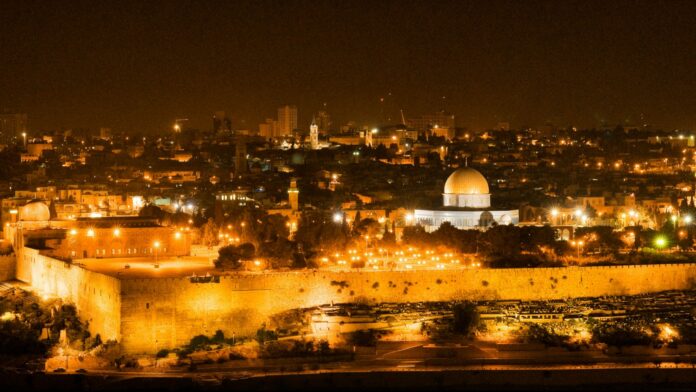First published by The Jerusalem Post
If I forget thee, O Jerusalem, let my right hand forget her cunning. If I do not remember thee, let my tongue cleave to the roof of my mouth; if I prefer not Jerusalem above my chief joy…
Psalm 137
The Psalmist records the lament over Jerusalem following the sixth- century BCE conquest by the Chaldeans. From exile in Babylon Jews cried: “How shall we sing the Lord’s song in a strange land?” These sentiments are an expression of the deep longing for the Jewish homeland and capital – the yearning of an indigenous people for the land of their birth.
One would imagine that the long history of Jewish connection to Jerusalem and the depth of feeling the Holy City has held in Jewish hearts over millennia would stand as unassailable evidence of Jewish connection to Israel. Not so, for those in the halls of power at the UN.
The UN has shown a determination to sever all Jewish association with Jerusalem. This constitutes a denial of history, an infraction against self-determination under international law, and a violation of indigenous rights in ancestral lands.
The UN General Assembly recently adopted the “Jerusalem resolution”, disavowing Jewish ties to the Temple Mount, referencing it solely by its Muslim name, al-Haram al-Sharif. This was business as usual at the UN – the continuation of a campaign to erase the Jewishness of Jerusalem. Indeed, the UN’s cultural arm, UNESCO, engaged in the same act of cultural colonisation in 2016, then referring to the Temple Mount only by its Arabic name.
The Jerusalem Resolution (129-11) not only neglects to use the Hebrew name for the holiest site in Judaism, but also repudiates all Israel’s claims on Jerusalem. It asserts that “any actions taken by Israel, the occupying Power, to impose its laws, jurisdiction and administration on the Holy City of Jerusalem are illegal”.
Further, the resolution reiterates that Israel’s “Basic Law” on Jerusalem and the proclamation of Jerusalem as “the capital of Israel”, “were null and void and must be rescinded forthwith, as well as its previous resolutions on Jerusalem”.
Israel’s 1980 Basic Law states that “Jerusalem, complete and united, is the capital of Israel” and that “Jerusalem is the seat of the President of the State, the Knesset, the Government and the Supreme Court”. It also makes provision for the protection of Holy Places and for the ongoing development of Jerusalem.
Israel further strengthened this law in 2018 with the passing of its “Fourteenth Basic Law: Israel as the Nation State of the Jewish People”, in which it reaffirmed, amongst other things, that:
The Land of Israel is the historical homeland of the Jewish people, in which the State of Israel was established.
The State of Israel is the nation state of the Jewish People, in which it realizes its natural, cultural, religious and historical right to self- determination.
The law also re-asserted that “Jerusalem, complete and united, is the capital of Israel”.
Predictably, various human rights organizations challenged the Basic Law in the Israeli courts but in July 2021 Israel’s Supreme Court largely rejected their petitions, stating that, “the Basic Law did not introduce anything new, but merely stated the obvious – that the State of Israel is the nation state of the Jewish people. This was the premise on which the state was established, as enshrined in the Proclamation of Independence”.
The Israeli Supreme Court ruling affirmed the constitutionality of Israel’s Basic Laws that recognize “the right to national self-determination in the State of Israel is unique to the Jewish People” and enshrines principles already evident in regular legislation that reflect the Jewish character of the state. These include the state symbols and emblem, the national anthem, Jerusalem as the state capital, Jewish immigration, holidays such as Memorial Day for the Fallen in Israel’s Wars, and the Holocaust Martyrs’ and Heroes’ Remembrance Day.
The UN’s attack on Jewish Jerusalem is simply part of its wider anti-Israel strategy seeking to undermine and delegitimize the only Jewish state in the world. UN bias is well-known, with its demographic make-up largely ensuring an automatic majority for every anti-Israel resolution proposed. The organisation’s position not only flies in the face of 3,000 years of the city’s history, but also blatantly contradicts its own position on the rights of indigenous peoples.
It was in the land of Israel that the Jewish people developed their unique culture and religious practices. They clearly fulfill the criteria of indigenous peoples, according to the UN’s own definitions: self-identification; historical continuity with pre-colonial and/or pre-settler societies; strong links to territories and surrounding natural resources; distinct social, economic, or political systems; distinct language, culture, and beliefs; resolve to maintain and reproduce ancestral environments and systems as distinct communities.
It is more than a mere discourtesy to avoid using the Jewish names and terms – the UN is directly contradicting its own 2007 Declaration on the Rights of Indigneous Peoples by denying Jewish indigenous rights ‘pertaining to their lands, territories and resources, including those which were traditionally owned or otherwise occupied or used’. By its anti- historical and unjust declarations, the UN merely discredits itself and undermines its status as a human rights body.
Jews are undeniably the indigenous people of Jerusalem, a claim supported by historical, archeological and genetic evidence. Jerusalem, otherwise known as Zion, is the Holy City of the Jewish people. Israel’s declaration of Jerusalem as its complete and united capital city should be supported by all who care about indigenous peoples and their rights.
If the UN were to apply to some good purpose all the energy expended against Jews and their ancient and indissoluble connection to Jerusalem, so much good could be achieved. We call on people of goodwill everywhere to urge their respective governments to stand on the side of truth and justice, and to bring change at the UN.



